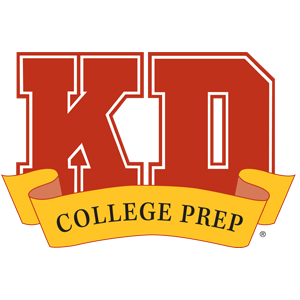Yes, the vast majority of this blog post is about vocabulary on the PSAT, SAT®, and ACT® tests. But bear with me for a few introductory paragraphs while I explain why I think a strong vocabulary is so important in general.
Here’s the thing about vocabulary: The words we know shape our perceptions of the world around us—having a word for a particular concept makes it easier to think about and talk about that concept.
Think about the word ennui. It’s a feeling of boredom and simultaneous mental exhaustion caused by having nothing interesting to do. (A whole lot of us suffered from severe ennui during the worst parts of the COVID-19 shutdowns, and I’m not the only one with a giant cross-stitch to prove it). Ennui is a French word, and we stole it from them back in the 1700s because it better encapsulated the complex emotion than did words like listlessness or boredom.
Vocabulary also shapes how other people see us. It’s a huge part of making a first impression, good or bad, as it guides a lot of what a stranger will assume about us. Are those assumptions fair? Probably not. You are not inherently smarter just because you have a superior lexicon to throw around. But are people going to think you are smarter? Probably so.
If you are reading this, you are likely a high school student on the cusp of attempting to convince strangers (potentially much older strangers) that you deserve admittance into particular colleges. This is done mostly through essays and interviews, so you will want to capitalize on the unfair assumptions involved in first impressions.
All that is to say, I think vocabulary will help you even outside a testing environment—from getting into college to getting jobs and promotions to communicating with others for the rest of your life. As my English degree shows, I’m biased about the importance of a strong vocabulary, and I will readily admit this. But I’ll get off my soapbox now and address the questions at hand.
Use the table of contents below to navigate to the sections found within this article:
Table of Contents
Is Vocabulary an Important Part of the PSAT, SAT, and ACT Tests?
The short answer? Yes! Vocabulary is absolutely an important part of the PSAT, SAT, and ACT tests.
The long answer? (Spoiler alert—the answer is still yes, just with a few caveats and clarifications).
Do you need to know arcane words that sound more like they belong in a magic spell than in the English language? Mostly, no (except for the historical document reading passage on the PSAT/SAT test—but I’ll get to that). What you do need is a working knowledge of a college-level vocabulary.
There are questions about vocabulary, but the biggest reason you’ll need vocabulary is for reading comprehension and speed. After all, these are timed tests. Your speed should be somewhere between brisk and breakneck depending on your testing style.
The SAT Test Changed Back in 2016. Does Vocabulary Even Matter Anymore?
If you have an older sibling who took the SAT prior to 2016 (or if you’re a parent who took the test in ye olden days), you are probably aware that there used to be a lot of vocabulary-heavy questions on the SAT test. Like, a lot.
Prior to 2016, 16 percent of questions on the Reading and Writing sections of the SAT test were “Sentence Completions.” These questions often contained obscure vocabulary. You had some context to inform you of what kind of word you were looking for, but you had to know the five advanced words making up your answer choices to correctly identify the matching word (see example below).
Though dolphins can be quite -----, jumping in waves and tossing seaweed, they are ----- when protecting members of their pod against predators.
(A) jocose .. ferocious
(B) malleable .. docile
(C) enervated .. decorous
(D) gentle .. decorous
(E) pious .. rectitudinous
And, of course, there were the analogy questions prior to 2005 that required you to know 12 different, and often rarely used, words for a single question without any context to go off of (see example below).
Alleviate : Mallady ::
(A) engender : progeny
(B) obfuscate : verisimilitude
(C) sustain : diversion
(D) invigorate : monotony
(E) protract : prudence
Thankfully, both of these question types have been put out to pasture. You do not need to know the meaning of “obfuscate” in a vacuum. But you might need to know the meaning of “obfuscate” in context. So don’t pile all your vocabulary cards in the backyard and douse them with lighter fluid just yet.
How Have Vocabulary Questions Changed on the “New” SAT Test?
According to College Board, the current version of the SAT test “won’t test you on the meaning of obscure, seldom-used words and phrases presented with little context. Rather, you’ll be tested on words and phrases that often appear in college courses and beyond and that are grounded in rich contexts.” So the kind of words you are tested on are words that are used fairly often in high-level documents (literature, political speeches, medical or sociological reports, etc.) and have multiple meanings depending on the context.
A good example is the word “repellent.” In a literature passage, a character may have a repellent personality, meaning that the character acts in an off-putting, possibly disgusting, manner. In a scientific passage, the author may discuss the efficacy of insect repellent in reducing cases of malaria in a given area. You would then be asked to identify how the word is being used in the passage (are we talking about a bad person or bug spray?)
That said, just because you won’t be tested on obscure vocabulary, doesn’t mean you won’t see obscure vocabulary on the test. College Board states that each Reading section of the test will include five passages:
- “One passage from a classic or contemporary work of U.S. or world literature.
- One passage or a pair of passages from either a U.S. founding document (such as an essay by James Madison) or a text in the Great Global Conversation (such as a speech by Nelson Mandela).
- One passage on a social science topic from a field such as economics, psychology, or sociology.
- Two science passages (or one passage and one passage pair) that examine foundational concepts or recent developments in Earth science, biology, chemistry, or physics.”
Source: College Board
Types of Passages
The natural science and social science passages don’t present much of a challenge vocabulary-wise. But the same is not true for the literature passage and the founding documents passage.
Literature Passage
Here’s a snippet from the sort of passage you might find on the literature section:
“Ms. Russel, a prying, curious widow, who, whatever might be her reasons for doing so, would rather listen to another’s dealings than tend to her own, excused herself from the conversation at hand upon recognizing the clear tone of Ms. Kellynch. The governess in question was presently occupied with the tedium of convincing the young master that the object of his ambition, namely, one currently steaming morsel sat upon the windowsill, would remain firmly beyond the bounds of his grasp until he could recite his letters with perfect correctitude.”
Technically speaking, none of those words are obscure. But unless you have a penchant for Jane Austen novels, you’ve probably never heard people talk or write like this. When my roommate asks me if our Uber Eats order arrived as expected, I certainly don’t tell her that the food made it to the doorstep with “perfect correctitude.” Not to mention, while you’ve probably heard the word “governess,” do you know what one is? A governess is basically an all-in-one live-in nanny and home-school teacher for old-school rich people.
Ultimately, if you aren’t at least a little familiar with speech patterns, word choices, and societal concepts from past generations, the literature passage can slow you down a lot, wasting time and probably forcing you to read and reread sections just to figure out what is happening.
Historical Documents Passage
Now take a look at this excerpt from Abraham Lincoln’s “Address to the Young Men’s Lyceum of Springfield, Illinois,” a historical documents passage that you may find on the SAT test.
“There is no grievance that is a fit object of redress by mob law. In any case that arises, as for instance, the promulgation of abolitionism, one of two positions is necessarily true; that is, the thing is right within itself, and therefore deserves the protection of all law and all good citizens; or, it is wrong, and therefore proper to be prohibited by legal enactments; and in neither case, is the interposition of mob law, either necessary, justifiable, or excusable.”
The complexity of this passage’s sentence structure and its challenging vocabulary are pretty typical of historical document passages. Yes, there are easier passages, but there are also harder passages.
A common question on the SAT test may ask you what Lincoln’s main argument was. (Here, Lincoln is arguing that any injustice should be addressed through legal systems of government and that just causes will, eventually, be protected by law, and unjust causes will be prosecuted by the law, and, no matter what the cause, citizens shouldn’t take the law into their own hands).
So answer me this: how many times did you have to read that paragraph to really understand it? (Because it definitely took me more than twice). As you can see, this type of writing will slow you down. It’s nearly impossible to skim something this linguistically dense and come out with a clear understanding of what’s being said.
You are going to see at least two passages on each SAT test that will use atypical vocabulary and written structure. You will probably have to move more slowly through these two passages,. And this can be risky on a test designed to leave you short on time. Keep in mind that each passage includes about 10 or 11 corresponding questions, and you simply can’t afford to miss 20+ questions if you want a competitive score.
The bottom line is that while vocabulary questions on the SAT test have changed over the years, vocabulary is still an important aspect of the test. Before test day, study vocabulary and practice answering questions in a “Words in Context” format. This may help you see a major impact on your scores.
What Do Vocabulary Questions Look Like on the PSAT, SAT, and ACT Tests?
Vocabulary questions on the PSAT and SAT tests are called “Words in Context.” They will look mostly the same on both tests. The difference is that the Reading section will require you to pick the best synonym for a word in the passage whereas the Writing section simply tasks you with filling in the blank. In both scenarios, you’ll have to use context clues to determine the way a word is being used.
Example of what you may see on the PSAT/SAT Reading section:
“When a sojourner in south central Connecticut decides upon the wrong fork at the crossroads of Dunwich pike just beyond Howard’s Corners she finds herself entering a forlorn and otherworldly country. The landscape becomes elevated, and the pebbled stone walls begin to choke the old roads that wander fearfully around the gnarled trees that offer their oppressive security.”
As used in line 1, “sojourner” most nearly means:
A) tourist
B) tenant
C) transient
D) traveler
Example of what you may see on the PSAT/SAT Writing section:
In a disconcerting turn of evolutionary events, both B. ephippium and B. pitanga are incapable of hearing their own mating calls due to their underdeveloped ears, leading scientists to wonder why they bother making the noise in the first place.
A) NO CHANGE
B) knotty
C) perplexing
D) worrying
Vocabulary questions on the ACT test assess the same skills as vocabulary questions on the SAT tests. However, the format for reading questions is slightly different. The Reading section, instead of asking for a synonym, will ask for clarification of an idea or a specific term. However, the English section tests vocabulary in the same manner as does the SAT Writing/Language section.
Example of what you may see on the ACT Reading section:
The phrase “diverging viewpoint” as it is used in line 11 refers to:
A) a dispassionate argument
B) an iconoclastic tenant
C) a contentious diatribe
D) an ephemeral maxim
How Hard Are Vocabulary Questions on the Tests?
As the excerpts above hopefully show, the vocabulary questions for the PSAT, SAT, and ACT tests really are not especially hard if you know what to expect.
Most of the words you will be tested on are words you should come across through your high school coursework. The hardest part is interpreting the language used in the literature and historical documents passages and knowing how to tie words to meaning and main ideas.
How Can I Memorize Vocabulary Before Test Day?
Studying test vocabulary doesn’t work like studying vocab for your Spanish class. You can’t just make a bunch of flash cards and cram the night before.
For the best results, start preparing for the verbal sections of the PSAT, SAT, and ACT tests as soon as possible. To clarify, we normally recommend that students aim to finish testing by the end of 11th grade. If you’re going for a competitive test score, this means planning to take both the SAT and ACT tests at least twice.
So if you’re reading this as a 6th grader, it’s probably a little early for you to start preparing for the tests. But if you’re already in the 10th grade, now is the perfect time to start! At KD, we offer a variety of test prep programs to help you reach your test score goals.
And remember, pulling an all-nighter before test day will only make you more tired and slow down your response time. This is not ideal since these are very fast-paced tests. In our experience, cramming rarely gives you any real benefit. Instead, try these methods.
1. Read the Classics
One of the most reliable ways to expand your vocabulary is to read college-level books. And since reading harder books is time consuming, it would be best to start early. The types of books that will read most like the hardest literature passages on the PSAT/SAT/ACT tests are what we typically consider “classics”—books by Jane Austen, the Brontë sisters, Charles Dickens, F. Scott Fitzgerald, John Steinbeck, Mark Twain, and the like.
Start with your high school English reading lists. If there are any books on your high school syllabi from previous years that you didn’t actually read, read those first. (And hey, if you read every single book you were ever assigned in school, you deserve a cookie. Even straight-A students skim through books every now and then).
After checking off previously assigned reading, find reading lists online like this list of 100 classics. Pick the books that sound most interesting to you.
The idea behind reading classics is not to read content that you think will actually be on the test. To be honest, I’ve never seen an excerpt from anything I’ve read on a test. And it’s almost impossible to predict exactly what you’d find.
The idea is just to get used to how writing and speech sounded 100+ years ago so that you are used to it and can move more quickly through those passages.
2. Read Historical Documents
If you want to be extra ambitious, read letters and speeches written by our Founding Fathers like James Madison, Alexander Hamilton, Thomas Jefferson, etc. Older historical documents tend to follow a more dense or legal style of writing that is harder to understand. You probably aren’t used to reading long paragraphs filled with words that no one uses nowadays.
This will certainly not be the most entertaining form of reading, but it will help you prepare.
3. Listen to Audiobooks
I know this opinion will be controversial since many capital “R” Readers feel like listening to an audiobook doesn’t actually count as reading. But you don’t have to limit yourself to physically reading a book to gain vocabulary knowledge. Yes, you are much more likely to notice vocabulary that you don’t know in print form. And seeing the word written down certainly makes the word easier to look up. But if you are an active, attentive listener, audiobooks can be a great supplement to eyes-on-page reading.
For example, this morning I was listening to a mystery-of-the-week novel while getting ready—two activities that seem completely unrelated to studying vocabulary for college admissions tests.
The book was far from classic literature, but while multitasking, I mentally flagged two words to look up later. One word was “jocular.” I’d heard it enough that I thought I knew what it meant, but I wasn’t 100 percent sure. Turns out I was way off on the meaning, which is to be fond of joking, humorous, or playful. The second word, “saturnine,” was definitely a word I didn’t know. It means a slow and gloomy temperament. After screwing up the spelling of both words and letting Google do its thing, I now have two new words in my lexicon.
4. Make Vocabulary Building a Part of Your Lifestyle
There is no shame in making a concerted effort to improve the way you communicate with others. And it can even be fun!
My main point here is that there are many ways to build up your vocabulary knowledge. Read, listen to, or watch anything and everything: YA novels, comic books, podcasts, news articles, webtoons, movies, and TV.
Be present when you are consuming media. Make notes when you stumble upon a word you don’t already know. Write it down and remember to look the word up later.
If flash cards work for you, then make a flash card with the word and definition (or use virtual flashcards). Write new words down in a journal or in your iPhone notes. Reread the definitions each day until they stick. You could even write the words and definitions on sticky notes and place them on your bathroom mirror to recite until you know them well.
Gathering and studying vocabulary for admissions tests is not quick, but it can become an easy part of a life-long learning habit.
Can I Use a Dictionary or Thesaurus on the PSAT, SAT, and ACT Tests?
This is a hard “no.” There are absolutely no dictionaries or books of any kind permitted for the PSAT, SAT, or ACT tests, even if English isn’t your first language. So, you’ll need to establish a deep knowledge of vocabulary before test day if you want to reach your best scores.
Need Help Preparing for Upcoming Tests?
At KD College Prep, we offer in-person and online test prep programs for students in 7th–12th grade. Since 1992, we helped more than 72,000 students prepare for the PSAT, SAT, and ACT tests, and we have a team of amazing instructors and curriculum writers who specialize in teaching the verbal material found on these tests.
Schedule a free consultation to learn more about our programs.














































